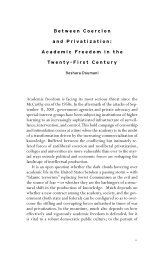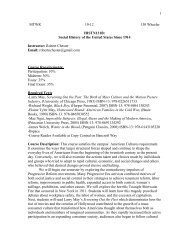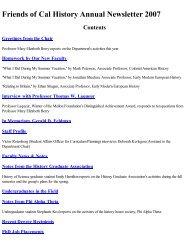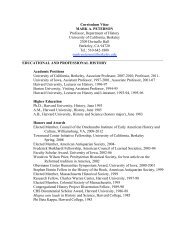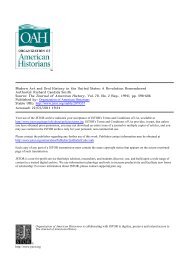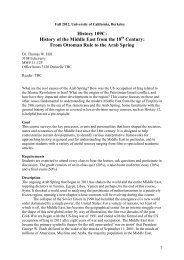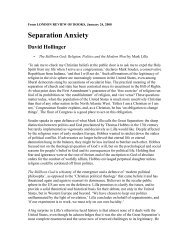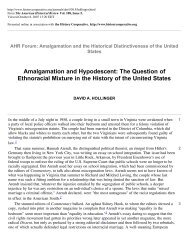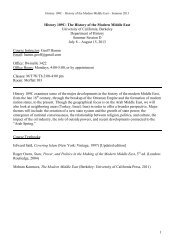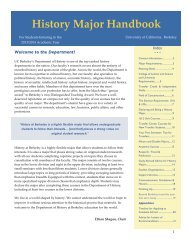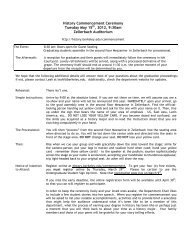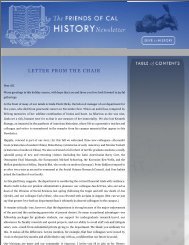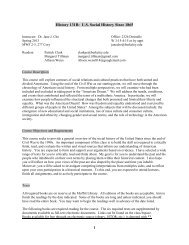My Grandmother and Other Stories: Histories of the Palestinians as ...
My Grandmother and Other Stories: Histories of the Palestinians as ...
My Grandmother and Other Stories: Histories of the Palestinians as ...
Create successful ePaper yourself
Turn your PDF publications into a flip-book with our unique Google optimized e-Paper software.
Act Three<br />
So <strong>as</strong> to replace doubt with certainty, I accompanied my wife <strong>and</strong> mo<strong>the</strong>r-in-law <strong>the</strong><br />
following day to Deir Y<strong>as</strong>sin. Fluent in Hebrew, I have some ability to deal with <strong>the</strong><br />
Israeli administration.<br />
The mental hospital in <strong>the</strong> village is located on Deir Y<strong>as</strong>sin’s northwestern slope, <strong>and</strong><br />
looks out over <strong>the</strong> ruins <strong>of</strong> <strong>the</strong> deserted village Lifta. The hospital building is one<br />
<strong>of</strong> <strong>the</strong> few Arab structures that remains, a witness to Deir Y<strong>as</strong>sin <strong>and</strong> <strong>the</strong> infamous<br />
m<strong>as</strong>sacre <strong>of</strong> its inhabitants by <strong>the</strong> Irgun led by Menachem Begin in April, 1948. The<br />
building w<strong>as</strong> transformed by Israel into a mental hospital (<strong>as</strong> if that w<strong>as</strong> all Deir Y<strong>as</strong>sin<br />
w<strong>as</strong> missing!) with some additions that cl<strong>as</strong>h with its historic design <strong>and</strong> make it<br />
difficult to guess at its original appearance. The rectangular building is made <strong>of</strong> solid<br />
Jerusalem stone that remains a brilliant white, refusing to allow time to take its toll.<br />
I rang <strong>the</strong> doorbell <strong>and</strong> a young Israeli opened <strong>the</strong> door. He <strong>as</strong>ked us in Hebrew about<br />
<strong>the</strong> purpose <strong>of</strong> our visit <strong>and</strong> I <strong>as</strong>ked to meet Sheikh al-Labadi, who w<strong>as</strong> staying in<br />
<strong>the</strong> hospital. He <strong>as</strong>ked our relation to <strong>the</strong> patient, <strong>and</strong> this w<strong>as</strong> e<strong>as</strong>y to prove with my<br />
mo<strong>the</strong>r-in-law’s identification card. We entered a clean, square, brilliant white room<br />
with an Arab split-arched ceiling. Its walls were lined with simple wooden chairs<br />
incongruent with <strong>the</strong> height <strong>of</strong> its soaring ceiling <strong>and</strong> <strong>the</strong> splendor <strong>of</strong> <strong>the</strong> building<br />
in its glory days. A few minutes later, a woman in her late 50s entered <strong>the</strong> room <strong>and</strong><br />
<strong>as</strong>ked if we spoke Hebrew. After affirming that I do, she introduced herself <strong>as</strong> a social<br />
counselor working in <strong>the</strong> hospital. Then she <strong>as</strong>ked if we were visiting Sheikh al-<br />
Labadi for <strong>the</strong> first time. We responded in <strong>the</strong> affirmative, <strong>and</strong> she <strong>the</strong>n <strong>as</strong>ked why we<br />
had not visited him before.<br />
I w<strong>as</strong>n’t able to tell <strong>the</strong> story I had heard <strong>the</strong> night before, for I w<strong>as</strong> afraid that it would<br />
turn me into a laughingstock <strong>and</strong> I, too, would be committed. Nothing seemed normal.<br />
I replied that we wanted to make sure he w<strong>as</strong> <strong>the</strong> right person first. Then we would tell<br />
her <strong>the</strong> story from <strong>the</strong> beginning, even if seemed odd <strong>and</strong> its narration w<strong>as</strong> lengthy,<br />
<strong>and</strong> even if it turned me into an object <strong>of</strong> ridicule. If she had no objection, we would<br />
like to visit him first, she said. “Nothing harms <strong>the</strong> sheikh, for he is hardly aware <strong>of</strong><br />
what’s around him. It might help him to see new faces.”<br />
Act Four<br />
Only a few minutes had p<strong>as</strong>sed since our arrival, but it seemed <strong>as</strong> if it had been all <strong>of</strong><br />
time, or at le<strong>as</strong>t a drawn-out epoch. What if it really w<strong>as</strong> our hero sitting in <strong>the</strong> next<br />
room? What could he say to us after this absence? W<strong>as</strong> he truly crazy, <strong>and</strong> is that why<br />
he w<strong>as</strong> here? What would he look like after all <strong>the</strong>se years? And would my mo<strong>the</strong>r-in-<br />
[ 14 ] HISTORICAL FEATURES Sheikh H<strong>as</strong>san al-Labadi & Seven Acts <strong>of</strong> Lost Memory



